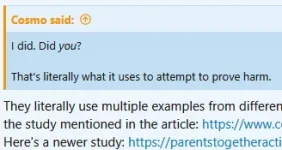blur
DP Veteran
- Joined
- May 23, 2024
- Messages
- 936
- Reaction score
- 887
- Gender
- Female
- Political Leaning
- Undisclosed
Convenient. Do you believe that emotional harm exists (since that is more on the topic of what we are discussing)?
So, is death the only evidence of harm you would accept?Death directly attributed to an act. For example, we can conclude that shooting yourself in the head is harmful if the resulting massive hemorrhage kills the person.
Legal complaints have to stand against a certain level scrutiny to survive. The lawsuit has already been granted the go ahead to move forward in federal court, if the plaintiffs had no case, the entire thing would have been dismissed.Well of course the legal COMPLAINT had a different interpretation!
As I've already mentioned, I haven't read the entire legal complaint (post #62). I'll read through more of it, and I will consider your interpretation. The parts that I have read concluded that the chatbot was encouraging suicide.Are you honestly incapable of reading the entire (very short) conversation featured in the PDF you linked and arriving at the obvious conclusion given numerous obvious clues? I mean it flat out says "You can't do that! Don't even consider that!" I don't know how much more obvious it can get and can only conclude you're posting your argument in bad faith at this point.
Let me help you out: "If" implies something is conditional: "A person could have an unhealthy attachment to anything: their job, their girlfriend, video games, alcohol, etc. If you can't go one day without the thing you "like" without feeling "depressed and crazy", that is an unhealthy attachment. Anything that gets in the way of you functioning in your daily life is unhealthy."Your criteria was:
Which literally implies anything can be unhealthy.
My criteria for what constitutes unhealthy is not "anything", my criteria as laid out in the quote above: "If you can't go one day without the thing you "like" without feeling "depressed and crazy", that is an unhealthy attachment. Anything that gets in the way of you functioning in your daily life is unhealthy."
So, my criteria is if something proves to be disruptive or harmful in a person's life, that is likely unhealthy. Do I think that all things that have the potential to be unhealthy to an individual should be 18+? Definitely no, and I never stated that.
Nope. You're relying pretty heavily on these straw men you keep propping up. All just to dodge a pretty simple question.So then do you admit porn is irrelevant to the discussion? Good.
We're talking about what is appropriate or not appropriate for kids to be exposed to. You asked me if kids should be exposed to Lolita or My Girl, and I answered you. You lied and said I dismissed you, but I answered your questions. I never stated they were "irrelevant" to the topic, I explained why they were comparable to what you attempting to compare them to.No point in discussing something irrelevant to the topic.
Now, you're being a tad hypocritical, and are avoiding my questions. You want to have a one-sided discussion where I'm the only one presenting a position/arguments, and you attempt to poke holes in them without ever providing any clarity as to what your actual position is. So, there's a few possibilities, but these two I think might be most likely: You either don't want to say that you believe children should not be exposed to porn because then you and I essentially agree, and (I would assume) you would also be agreeing that certain content kids should not be exposed to, and those restrictions are acceptable, and companies who try to break those restrictions would be wrong for doing so. The other possibility, is a bit darker and creepier in my book.
"Potentially harmful" is vague. I think that sexually explicit material should be rated 18+. I also think that chatbots shouldn't be permitted to engaged in "sensual" and "romantic" conversation with children. Those have been my two main positions this entire discussion. Do you agree with those two positions?Let's just cut through the bullshit of you "asking for your opinion" on irrelevant shit: you think companies should be required by law to rate anything potentially harmful to under-18s as 18+? And if you don't how do you reconcile that with your aforementioned criteria I quoted above?







